![]()

Careers
Unit
Funded
by a Student Teaching Grant from the College of Education
Written By: Wendy Miyasato, Lisa Casey, and Yuuko Wright
Background
This unit was written during our student teaching semester when we were given the opportunity to apply for a student teaching grant. This thematic unit focused on the kindergarten curriculum with an emphasis in social studies.Because children begin to form ideas about future careers at an early age, it is important for children to learn about different kinds of careers available to them. Many children see community helpers only as those people who wear uniforms or have jobs that we see or hear about frequently. Children often do not realize there are many other workers who contribute to a successful community. The purpose of this thematic unit was to help our students realize that it takes many different jobs for a city or town to work together as a community. Students need to understand and realize how various careers are needed in order for communities to function safely and effectively and make the environment a more comfortable place to live.
Having the opportunity to make your own choices is a must in our socitey. Our students need to know that they can make their own choices when it comes to choosing a career. We wanted our students to become aware of the different occupations and choices that are available to them. This unit helped our students begin their schooling eager to learn, grow, and prepare for their futures. Students will learn about different careers through read-alouds, guest speakers, lessons, and field trips. They will display their knowlege and understanding by writing, drawing, discussing, and completing a careers unit matrix. The activities will integrate language arts with other subjects such as, social studies, science, geography, math, technology, and art.
Many of these students have limited opportunities to know about career choices and may not see themselves as professionals or community leaders. They need to be exposed to a range of career possibilities and recognize that they are capable of making a contribution to their community. They also need to appreciate the contributions that various people who work in the community make to the children's lives. The purpose of this thematic unit was to help our students realize that their community is made up of a system of dependence and interdependency. We want them to understand that all parts of the system work together to make their community function safely and effectively.
Objectives
Students will be able to....
- know the services, duties, and responsibilities provided by different community members and know what they need in order to prepare for a career.
- draw/write the services of each career.
- draw/write the duties and responsibilities of each career person.
- identify and tell the purposes of the tools each career person uses.
- identify and tell the skills that are needed for each career (social, workingcooperatively, literacy, and technology skills).
- be aware of the different choices and careers they have and understand how they are building a foundation of learning skills that they may use in their career choice.
- discuss and write about what they can be when they grow up.
- complete the second column of the KWL matrix by sharing what they know about that career.
- ask questions relateing to what they want to know about that career for the third column.
- volunteer information on what they learned about that career to complete the fourth column.
- identify and evaluate their personal behaviors, decisions, actions, and choices they make that may affect the safety of themselves and others in their community.
- identify and discuss which community members affect their lives.
Instructional Outline
Day
One
|
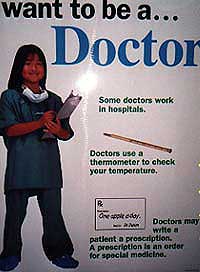 |
|
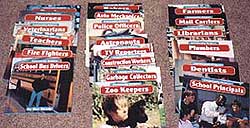 |
|
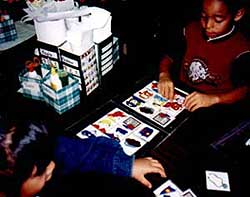 |
- KWL Matrix Activity (Graphic Organizer) of the different careers as an introduction and then completing the matrix as you go along. This will include all the careers being covered.
- Introduction Song on "Who Are The People In Your Neighborhood?"
- Read-aloud - Introduce the first career to be covered which will be the oceanographer.
- Discussion after reading and work on the KWL Matrix.
- Introduction to the Afternoon Learning Centers - Go over rules, expectations, how materials are to be used,and etc.
Day Two
- Science lesson experimenting with pH levels of different types of water.
- Afternoon learning centers.

Day Three
- Classroom Mural Activity which will incorporate cooperative learning as the class works together to create their own mural by drawing, painting cutting out, and gluing, etc. Every child will contribute to the mural.
- Afternoon
learning centers.
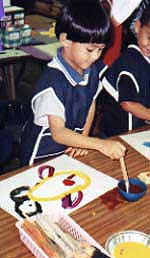
Day Four
- Sea Life Park Field Trip - Tentative
- Complete KWL Matrix. We will discuss what we learned and fill in the "L" Section of the matrix.
- Writing Activity where they will start the first page to their books called, "What I Can Be When I Grow Up". They will draw and write about at least one thing or more on what they learned about an oceanographer.

Day Five
- Start with completing KWL Matrix on a Zookeeper
- Read-aloud to introduce what a zookeeper is and what she does.
- Discussion after reading and work on the KWL Matrix.
- Afternoon Learning Centers
- Discussion of rules and behaviors for field trip tomorrow.
Day Six
- Field trip to the zoo.
- Have the zookeeper speak with the students during the field trip about her career and duties.
- KWL Matrix - Fill in the "L" Section when we return from field trip.
- Discussion on the field trip and what they learned.

Day Seven
- Habitat lesson on how the zookeeper is responsible for the animal's habitats and how they protect us from the animals in the zoo. They will work cooperatively to create their own trioramas of different habitats. Each group will be responsible for one triorama.
- Afternoon Learning Centers

Day Eight
- Animal Puppet Activity where students willl create their own sock puppets. These will be used in their learning centers and they will have a drama role play at the end of the day.
- Afternoon Learning Centers
- Writing Activity - continuation of "What I Can Be When I Grow Up". They will draw and write about at least one or more things they learned about a zookeeper.

Day Nine
- Weather Song called "What's the Weather Like Today?" We will teach this song to help introduce the weather reporter career.
- Incorporate Weather Graph/Calendar (Graphic Organizers) - These will be used daily to make predictions and keep track of the weather as a whole class.
- Read-aloud on the Weather Reporter.
- Discussion after reading about the story and work on the KWL Matrix.
- Afternoon Learning Centers
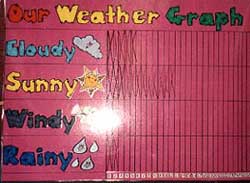
Day Ten
- Weather Calendar Activity - The students will get their own individual calendars and cut out pictures of the different kinds of weather. Each day they will place the appropriate picture on that day to track the different kinds of weather.
- Check weather on the internet to incorporate geography. They will compare the weather of their area to other areas on the island like Manoa.
- Afternoon Learning Centers
- Predict Weather for the next day.
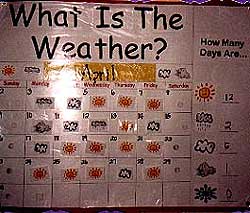
Day Eleven
- Check weather predictions
- Water Cycle Lesson - The students will learn about how the weather is dependent on the atmosphere and see how the water cycle affects them. When the rain collects in the clouds and builds up, then that creates rain. We will talk about how rain is part of a cycle that circulates from the ground by the sun, to the clouds, into rain, and back to the earth.
- Weather Prediction for the next day.
- Afternoon Learning Centers
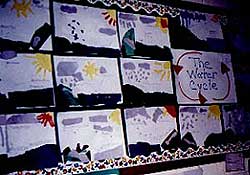
Day Twelve
- Check weather prediction
- KWL Matrix - Fill in "L" Section
- Writing Activity - "What I Can Be When I Grow Up"
- Afternoon Learning Centers
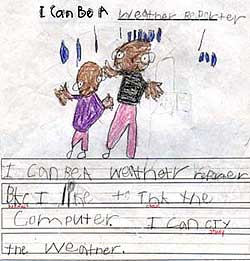
Day Thirteen
- KWL Matrix Activity to introduce Doctor.
- Read-aloud on Doctor
- Discussion after reading on the story and fill in KWL Matrix.
- Afternoon Learning Centers
- Go over rules and expectations for the guest speaker the next day

Day Fourteen
- Guest Speaker Emergency Technicians or Doctor
- Discussion after the guest speakers
- Fill in KWL Matrix
- Afternoon Learning Centers
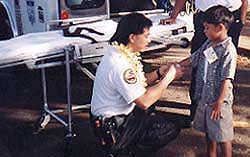
Day Fifteen
- Stethoscope Activity where each child will make their own stethoscope and see how it works and what the doctors use it for.
- Fill in KWL Matrix
- Afternoon Learning Centers
Day Sixteen
- Writing Activity - "What I Can Be When I Grow Up"
- Fill in KWL Matrix Activity
- Afternoon Learning Centers
Day Seventeen
- KWL Matrix to introduce Police Officer
- Read-aloud on Police Officer
- Discussion after reading
- Afternoon Learning Centers
- Review rules and expectations for the upcoming guest speaker.

Day Eighteen
- Guest speaker - Police Officer
- Safety Book Activity where the students will make their own safety books to take home.
- Discussion after the guest speaker leaves
- Fill in KWL Matrix
- Afternoon Learning Centers
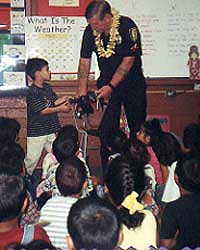
Day Nineteen
- Fill in KWL Matrix
- Read-aloud on Fire Fighter
- Discussion after reading
- Afternoon Learning Centers
- Discussion on what you can do in case of a fire. Go over proper procedures and safety rules.
- Escape Route Lesson where we incorporate geography when they draw out their own school and home and plan an escape route in case of a fire.
- Go over rules and expectations for guest speaker.

Day Twenty
- Fire Truck Demonstration where the fire fighters bring a fire truck to our school and speak to the students about their job and about how their fire truck works.
- Discussion after speaker
- Writing Activity - "What I Can Be When I Grow Up"
- Fill in KWL Matrix

Day Twenty One
- KWL Matrix to introduce an Author
- Read-aloud of an Author
- Discussion after read-aloud
- Afternoon Learning Centers
- Begin Writers' Workshop - The students will brainstorm and web out ideas for their next book called "I Want To Be A..." Begin using the strategies and procedures in a Writers' Workshop.

Day Twenty Two
- Writers' Workshop - Continuation and work on 1st Draft
- Fill in KWL Matrix
- Afternoon Learning Centers
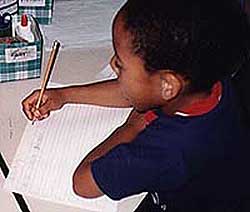
Day Twenty Three
- Fill in KWL Matrix to introduce Librarian
- Read-aloud on Librarian
- Discussion after read-aloud
- Sing a song called,"A Library Clerk Works At My School"
- Writers' Workshop - Continue and work on peer conferencing and editing
- Afternoon Learning Centers

Day Twenty Four
- Writers' Workshop - Continue and work on publishing
- Library Resource - Plan to go to the school library and have the librarian speak to the students about her career and duties.
- Afternoon Learning Centers
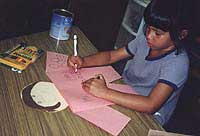
Day Twenty Five
- Fill in KWL Matrix
- Author's Chair where each child will read and share their completed book to the class.
- Alphabetizing Activity that incorporates library skills. The students will have to alphabetize their books by the author's last name.
- Fill in KWL Matrix
- Closing discussion and overview of the entire completed matrix.
Assessments
Graphic Organizers: KWL Matrix - The KWL Matrix was used to organize data the students learned throughout the unit. It was completed after each career.


Weather Graph - Students would make predictions first and then the next day the actual weather will be recorded. Results were examined and compared.

Weather Calendar - Used to keep track of the daily weather.

Ocean Mural - Students worked cooperatively to produce a class mural.

Safety Booklet - Students completed a safety booklet after the guest speaker of a police officer.
Discussion - Through verbal responses during discussion we were able to hear the students' responses on each career.
Journal Writing Book - "What I Can Be When I Grow Up" - Each child created their own journal writing book through writing and illustrations.

Career Book - "I Want to Be ..." - Each child wrote a book about what they would want to be when they grow up. They were able to choose and write about their career choice through the writing process. Their completed books were our assessment.
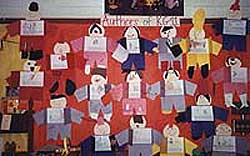
Community Helper Activities - This CD-ROM provided our students with an experience at the computer and technology.
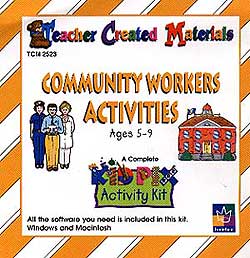
Annotated Bibliography
Broekel, Ray. (1986). I Can Be An Author. Chicago: Childrens Press. (J 371.4268 Authorship-B).
This book provides information on how an author works and what they do.
Deedrick, Tami. (1998). Zoo Keepers. Mankato: Capstone Press. (Classroom Book).
Each page covers a different subject such as, what zoo keepers do and what tools they use.
Green, Carol (1988). I Can Be A Librarian. Chicago: Childrens Press. (J-371.4268-Library Work-G).
Students can relate to the content of this book because they are familiar with the library system and librarian in their school.
Hankin, Rebecca. (1985). I Can Be A Fire Fighter. Chicago: Childrens Press. (J-371.4268-Fire Fighters-H).
This book shows how fire fighters rescue people, fight fires, give medical care, and give safety talks.
Kunhardt, Edith. (1989). I'm Going To Be A Fire Fighter. New York: Scholastic, Inc. (Classroom Book).
Even though this book talks about a voluntary fire fighter, it also provides information about the fire truck itself and the equipment that is used. Brief descriptions about what to do in case of a fire are included in this book.
Kunhardt, Edith. (1995). I'm Going To Be A Police Officer. New York: Scholastic, Inc. (Classroom Book).
This book was written from the viewpoint of a child whose father is a police officer. It also does not show any pictures or tell about "scary" incidents that police officers often encounter.
Martin, Claire. (1987). I Can Be A Weather Forecaster. Chicago: Childrens Press. (J-371.4268-Meteorology-M).
This book is useful to connect to the weather that is discussed during morning business.
Matthias, Catherine. (1984). I Can Be A Police Officer. Chicago: Childrens Press. (J-371.4268-Law Enforcement-M).
A picture dictionary of a police officer's services is provided in this children's book.
Raatma, Lucia. (1999). Crawl Low Under Smoke. Mankato: Capstone Press. (Classroom Book).
This book is specifically written for students who want to know the details of what to do when a fire does occur.
Raatma, Lucia. (1999). Home Fire Drills. Mankato: Capstone Press. (Classroom Book).
The importance of knowing the proper exits and practicing a fire drill is featured in this book.
Raatma, Lucia. (1999). Stop, Drop, and Roll. Mankato: Capstone Press. (Classroom Book).
The big pictures in this book are easy to follow if students want to practice.
Ready, Dee. (1997). Doctors. Mankato: Capstone Press. (Classroom Book).
This book mainly gives background information about where they work and what they wear.
Ready, Dee. (1997). Fire Fighters. Mankato: Capstone Press. (Classroom Book)
This book is organized into sections such as, what fire fighters wear and what tools fire fighters use.
Ready, Dee. (1997). Police Officers. Mankato: Capstone Press. (Classroom Book).
The illustrations in this book are excellent because they are big and easy to see for students during read-alouds.
Rowan, James P. (1985). I Can Be A Zoo Keeper. Chicago: Childrens Press. (J-371.4268-
Zoos-R).This is a good resource book to use if a field trip to the zoo is arranged.
Sipiera, Paul P. (1987). I Can Be An Oceanographer. Chicago: Childrens Press. (J-371.4268-
Ocenographer-S).Since a lot of the students on the Waianae coast grow up near the beach, they may find this career of interest to them.
Internet Sites
This site provides the students to go through a fire truck gallery to see the different kinds of trucks fire fighters use.
http://www.usfa.fema.gov/kids/index.htm
Students can plan an escape route of their house in case of a fire. Information about smoke alarms are also provided at this site. A section where students can color on the internet is featured or can be printed out for their own use.
Copyright 2000-2001 All Rights Reserved